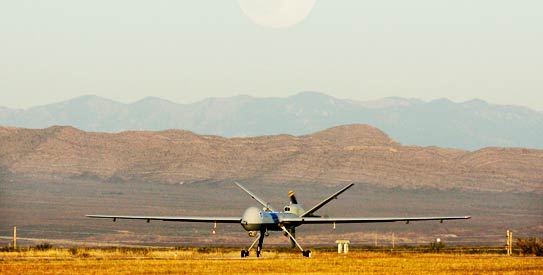
KARACHI: The UAE was seeking armed Predator drones from the US as long ago as 2004, secret US diplomatic cables accessed by Dawn through WikiLeaks reveal. Although UAE officials claimed they needed them “to control [the UAE's] long land and maritime borders”, it is not altogether clear from the cables and can only be speculated why the Emirati authorities needed armed unmanned aircraft and who the real target for such long-range weapons systems might be.
A previously unpublished secret cable dated July 28, 2004 details a meeting in Abu Dhabi between then US CENTCOM commander General John Abizaid and UAE Crown Prince Sheikh Mohammad bin Zayed bin Sultan al Nahyan, who also serves as chief of his country's armed forces. Among discussions of other matters regarding regional security, Sheikh Mohammad bin Zayed “reiterated his requirement for an armed Predator UAV [unmanned aerial vehicle]” and “expressed disappointment that US appeared ready to offer only an unarmed version.”
Sheikh Mohammad told the American general that “he was looking at co-developing in the UAE alternative UAV systems available from other countries” but was willing to “wait for a few months to hear from Abizaid before committing to another system.” In any case, he said he planned to make a decision by…mid-February 2005”.
The meeting between Sheikh Mohammad and General Abizaid followed on the heels of another meeting in Abu Dhabi on June 28, 2004 between CENTCOM's Deputy Commander Lt-Gen Lance Smith and UAE Armed Forces Deputy Chief of Staff Maj-Gen Hamad Thani al Rumaithy. In that meeting, detailed in a separate cable dated July 4, 2004, Gen Thani had pointed out that Sheikh Mohammad “had told him he was baffled that the USG [US Government] could sell F-16 Block 60s to the UAE and refuse to release an armed Predator”.
That meeting in turn had referenced a meeting a day earlier between Sheikh Mohammad and American Brigadier General Ronald D. Yaggi, where the initial request for a Predator had been made. However, the cable detailing this particular meeting (Cable Reference AbuDhabi2113) could not be accessed by Dawn and may not even be part of the trove of documents obtained by WikiLeaks.
Background research seems to confirm that the US eventually declined to sell Predators to the UAE, after which the UAE continued to approach other countries for UAV systems. The UAE also set up the “Abu Dhabi UAV Investment Company” in February 2007, and managed to produce its first drone, called Smart Eye, in 2010, which is considered to have a longer range and endurance than even the Predator. Smart Eye is designed to fly 135 hours without refuelling.
Interestingly, the meeting between Sheikh Mohammad and Gen Abizaid also revealed that the UAE already had been using drone technology “since the first Gulf War” and that the US had asked for the deployment of a squadron of the UAE's own Seeker II drones to Afghanistan. The deployment of the South African-produced shorter-range surveillance aircraft which were to be based in Bagram Airbase had been cancelled by the UAE at the last minute for which Sheikh Mohammad “apologised” to the American general, citing “border security requirements [that] mandated deploying the Seekers at home”. According to the cable, the UAVs were “being deployed in patrols along UAE's western border with Saudi Arabia”.
The July 28, 2004 cable - which is classified so as not to be shared with even friendly foreign governments - also indicates the level of military cooperation between the US and UAE. In it Gen Abizaid is noted as having thanked Sheikh Mohammad “for the UAE's strong support for coalition operations in Afghanistan, singling out the UAE special operations deployment for special praise”. It is not clear which special operations UAE forces were involved in Afghanistan. In addition, the cable reveals that the UAE had funded the transfer of Jordanian armoured personnel carriers or APCs to Iraq to support the US war effort there in cooperation with King Abdullah of Jordan.
Sheikh Mohammad also asked Gen Abizaid if coalition forces were finding Arabs in Afghanistan. “Abizaid said no. MbZ [Mohammad bin Zayed] responded that this was both good and bad - good because Arab extremists shouldn't be there, bad because we don't know where they are going and what they are doing instead.”
Sheikh Mohammad also expressed his concern over the release of Guantanamo detainees, saying they “had the potential to cause problems”. Giving the example of a released Jordanian detainee named Rami, he pointed out that Rami had been arrested by US forces in Tora Bora in Afghanistan, where he “had certainly not been there as a tourist”, adding “it would have been preferable for these people to have been killed in action”.












































Dear visitor, the comments section is undergoing an overhaul and will return soon.